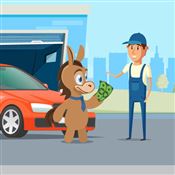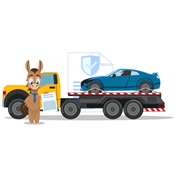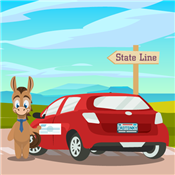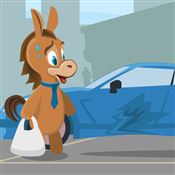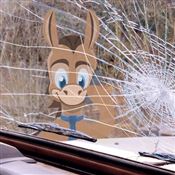Car Insurance Claims Check
Can you keep a car insurance claim check? And how long does it take to get it? Find out if you can use that money below.
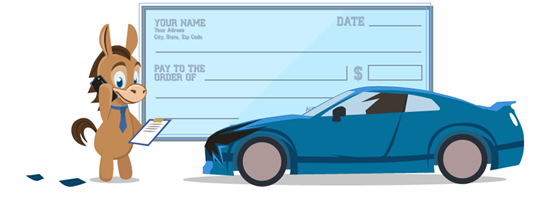 |
| © CreditDonkey |
Car accidents aren't fun. But at least your insurance sent a check to cover repairs. What happens next?
In most cases, you'll get a check sent directly to you. You can deposit or cash the check, get your car fixed at an auto repair shop, and move on from the accident.
Sometimes, life isn't so simple. Maybe the damage to your car is minor, and you'd rather use the money to pay bills. Or there are two names on the check, and you're not sure what to do.
We'll cover what you need to get your money and how you'll be able to spend it.
- Cashing an Auto Insurance Claim Check
- How Long Will It Take to Get the Check?
- Do I Have to Use the Check to Fix My Car?
Cashing an Auto Insurance Claim Check
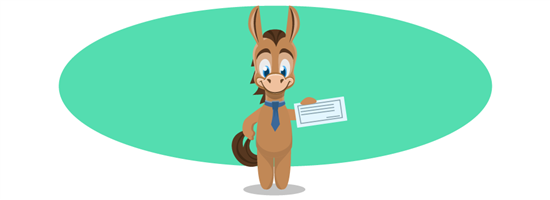 |
| © CreditDonkey |
There are three ways the insurance company can send out the claim check. We cover each below.
Insurance Check Made Out to You Directly
What to Do
- Confirm the check is made out only to you
- Deposit or cash the check
In this situation, you get a check directly from your insurance company or the other driver's insurance company. You can use this money for repairs, but you don't necessarily have to. (More on your options below.)
If you own the car outright, you can treat the check just like any other check made out to you. You can deposit or cash it as usual.
Check Is Made Out to You and the Bank
What to Do
- Sign the check
- Send the check and proof of repair to lienholder
- Lienholder signs check and sends it back to you
- Deposit or cash check to pay for repairs
When you agree to a lease or loan on your car, you agree to keep it in good working order. The car insurance company knows this. So when something happens to the car, they make the check out to both you and the bank (the lienholder).
That means you will need the lienholder to sign off on the insurance check before you can cash it. In some cases, you'll endorse the check and send it on to the lienholder.
Be prepared to work with the lienholder to get the check signed and repair the car. You'll likely need to send them documentation to prove the repairs were made before they send the check to you or the repair shop.
Typically, you'll have to bring the car to the dealership and ask a representative to sign a statement saying the car has been fixed. Then, you'll mail the bill, photos of the repaired car, and the check to the lienholder.
Your bank or lender will endorse the check and send it back so you can pay for the repairs. If your lender is a local bank, a bank officer may have to examine the car to make sure it was repaired.
If the other driver was at fault, their insurance will usually make out a check directly to you. Their liability coverage would pay for the claim without knowing if your car is financed or leased. They don't have any obligation to your financing company.
Regardless of whose name is on the check, you're still required by your lease or loan terms to keep your car in good condition. So, it's best to use the check to pay for repairs. Otherwise, you could be hit with fees or penalty fines when your lease is up.
Check Is Made Out to the Auto Body Shop
What to Do
- Bring your car to the specified auto repair shop
- Insurance company and repair shop works together to fix your car
An insurance company could also send the claim check directly to the auto repair shop. This is usually the case if your insurer requires you to choose from their list of preferred providers. These shops have a deal with the insurance company to repair cars that the insurer sends to them.
The body shop will write an initial estimate of the damage or repair costs and review the estimate given by the insurance company. The insurance company then writes the check directly to the repair shop to fix your car.
In this case, you would never receive the insurance claim check—you'd simply have to pay your deductible directly to the mechanic.
There are benefits to going to a preferred auto repair shop. If your car needs additional work or if something goes wrong, the insurance company will cover the costs. Plus, you don't have to coordinate with the shop and the insurance company since they work directly with each other.
How Long Will It Take to Get the Check?
How long you'll need to wait for your insurance check depends on who's paying: either your insurance company or the other driver's.
Your Insurance Company
It takes an average of 30 days to get your claims check through the settlement process. Before you get your check, the insurance company will send you paperwork, including a release that says you can't seek money from the accident again once the settlement is complete.
After you sign the release, the company will issue the settlement check. Any error or dispute, like disagreements about the release, can delay the process. For example, if you have unpaid medical bills related to the claim, you and your attorney should talk to medical providers to address those balances before your check is issued.
If you don't get your check within 30 days, contact your insurance company to see what's going on. You could consider hiring an attorney to help you through your legal rights.
Other Driver's Insurance Company
Most insurance companies stick to the same average for claim payouts—about 30 days. But if you are going through another driver's insurance company, the timeline may be different.
The insurance company will thoroughly investigate the accident to ensure they aren't paying for damage that they shouldn't be. To ensure the process goes as quickly as possible, follow these tips:
- Exchange contact and insurance information at the scene
- Get a police report
- Give a detailed report to the insurance company as soon as possible
- Find out your state's laws for paying a claim
If you haven't heard from the company in 30 days, contact them to find out the status of the claim check.
Do I Have to Use the Check to Fix My Car?
If you own your vehicle outright (meaning there is no lease or loan), you don't have to use it to fix your car. In fact, you can do whatever you want with the money.
You could find the cheapest mechanic, try to fix the problem yourself, or ignore the damage and using the money for something else entirely. But not using your insurance check to pay for repairs comes with some risks.
- You're responsible for additional costs if the problem gets worse.
- If you get in another accident, insurers won't pay for pre-existing damages.
- Reporting the same damage multiple times could be flagged for insurance fraud.
If you're fine with these risks, you can go ahead and use the money how you want. But remember that your car is an investment that you pay to insure. Especially if your car is new, it's worth it to keep it in good condition.
Bottom Line
After an accident, a car insurance company has several ways to send out a claim check. Whichever way the money gets to you, it's best to get your car fixed to avoid bigger problems down the road.
Write to Caitlyn Callahan at feedback@creditdonkey.com. Follow us on Twitter and Facebook for our latest posts.
Read Next:
